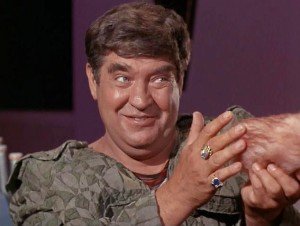 I’ll start this week’s thought-provoking commentary with a statement: I like Star Trek. Mostly. I’m no Trekkie/Trekker, but I greatly enjoyed TOS and TNG. DS9 had a few good moments. I refused to watch Voyager, and I thought Enterprise was well made but it lost my viewership after about six episodes. I love the JJ Abrams reboot movies. Well, the first one- I still haven’t gotten to see Into Darkness.
I’ll start this week’s thought-provoking commentary with a statement: I like Star Trek. Mostly. I’m no Trekkie/Trekker, but I greatly enjoyed TOS and TNG. DS9 had a few good moments. I refused to watch Voyager, and I thought Enterprise was well made but it lost my viewership after about six episodes. I love the JJ Abrams reboot movies. Well, the first one- I still haven’t gotten to see Into Darkness.
Now, all that aside, let me begin…
I was cruising the old Facebook this week on my PADD, er, tablet, and I saw one of those Trek Memes, with Picard on the bridge, talking. The caption was something about how in the 24th Century they no longer focused on the acquisition of wealth, but in improving the quality of life for all.
I call bullshit.
First off, that sounds akin to Communism. I know Trek has many times claimed that money didn’t exist in the enlightened 23rd-and-a-half-Century, but I can distinctly remember episodes and characters where merchants exist. Take Harry Mudd- no seriously, take him. Far away. Why didn’t they send him to the Borg – problem solved.
But let’s look deeper for a moment. Perhaps Captain Jean-Luc “I’m-a-talker-not-a-fighter” Picard was right. For argument’s sake, let’s examine the Federation as a moneyless empire. That would be communism. All the collective workers would be striving on equal footing, unable to acquire wealth, but rather to working like bees to better everyone around them. The janitors cleaning up puke from the holodecks at daycares around the Federation would be receiving the same benefits as the scientist sitting on the bridge scanning for lifeforms on some new planet.
In a galaxy like that, people would probably be judged based on their aptitude. You’d probably take a test that would determine if you were going to be a redshirt, or the people sending condolence emails to the redshirts’ family members. Not everyone could be a starship captain – or even hope to rise to that level from hard work.
A society like that would soon crumble. Without hope of a better, personal tomorrow, many folks would be apathetic. They wouldn’t work hard. They wouldn’t do the best maintenance job they could on the transporter buffers, for example. There would be a Federation of slackers who knew that as long as they punched the clock and went through the motions, they’d still go home to their Federation-specified sleeping quarters.
I seriously doubt Gene Roddenberry had such a “Utopian” Pinkos-in-space vision of the future in mind.
Fret not though- I can prove that Star Trek’s Federation is not communist. There is incentive for workers, and people can still acquire wealth.
First off, take a look at the San Francisco skyline in any Star Trek movie. All the buildings are not the same. Some are taller. Some are newer. Why is that? Why aren’t all the buildings the same? Why would some buildings be nicer than others? Taller? With better views?
Okay, I can see where Captain Kirk might rate a posh penthouse view as reward for his years of service. But remember in Star Trek 4, Save the Whales, when McCoy came to visit him? His walls were adorned with pricey antiques. Sure, he might have inherited them, but I’d wager he bought them. But with what? And how did Bones bring him antique glasses and Romulan ale? How would a geriatric, penniless Doctor pay for those commodities?
Barter.
Yes, the Federation may have done away with paper money and even coins, but clearly there would be room for a barter system. Take that Holodeck janitor I mentioned earlier. Say that he doesn’t work very hard, and therefore doesn’t wear his boots out in the time the Federation’s bean counters have predicted. When he’s issued a shiny new pair of boots, he finds he doesn’t need them. So he trades them to the guy who works on transporters. That guy wants a shiny new pair early, to impress the widow who lost her husband in a terrible transporter accident (totally not the transporter maintenance guy’s fault). Well, he has to trade something for them. Maybe he lets the Janitor beam all that vomit from the holodeck into deep space?
The point is, even in a cashless society, folks would have goods and services they could barter. And as countless science fiction shows have revealed, there is always a Klinger-like character who gets really good at that and accumulates a lot of material wealth through slick deals. My personal favorite was Lieutenant Krieg from Seaquest. The guy who managed to get Roy Scheider a burger in a world where beef was forbidden (a heart breaking episode for this cheeseburger lover).
 Eventually Klinger, or Harry Mudd if you prefer, would have enough junk accumulated to barter his way aboard a starship- or maybe even to get his own starship. He might even be able to get Captain Kirk, who’s decided to come out of retirement and will be in space most of the time anyway, to trade quarters with him- off the books, of course.
Eventually Klinger, or Harry Mudd if you prefer, would have enough junk accumulated to barter his way aboard a starship- or maybe even to get his own starship. He might even be able to get Captain Kirk, who’s decided to come out of retirement and will be in space most of the time anyway, to trade quarters with him- off the books, of course.
The point is, Picard is living in an alien probe-induced fantasy land when he thinks that people don’t still exist in the 24th Century who successfully gather wealth. Not everyone is Ghandi or Mother Teresa. There will always be folks who want to better their lives, rather than sacrifice so an unnamed stranger can be better off.
Yes, life in the Federation could be better than our own today. Or it could be like something out of Bladerunner or Judge Dredd, were the masses, who didn’t get into Star Fleet, live in boredom and poverty at ground level or in tiny, closet-sized sleeping boxes.
The only real way to have a society where everyone would be equal, where no one would seek to make it better just for themselves, would be one like the Borg have. Where they’re all machines, robotically working for a common, perceived/brainwashed good. And of all people to make the Communism-in-Space claim, Picard would surely be the last.
Hey, Internet Meme- Epic Fail. Try again.










“I seriously doubt Gene Roddenberry had such a “Utopian” Pinkos-in-space vision of the future in mind.”
Wrong. His wife Majel Barrett Roddenberry is on record as claiming that Gene saw the Chinese variant of communism, i.e. Maoism, as his ideal political form, and given that she basically spoke of him in glowing terms, this can be taken as outright fact. If this was the case, be aware that Maoism was directly and singularly responsible, via starvation, for the greatest nationalized mass murder in human history (yes, surpassing the Holocaust or the Stalinist Great Purges), and its leader said, and I quote, “Half of China may well have to die.” Half of China has been a number easily surpassing tens of millions people for millennia.
For those who doubt the political message of Star Trek, go and look up a brilliant article called “The Economics of Star Trek” by Michael Wong.
Star Trek TOS still had some form of currency, credits. TNG is a post-scarcity society where energy is very, very inexpensive (possibly even free) and anything you need can be made by a replicator. Thus, in such a society, only things that cannot be made by a replicator would be scare and therefore have value. In Star Trek, we don’t really get a full picture of human society outside of Starfleet, or of its political system (though it is alluded to be some form of democracy). Starfleet is organised on a military-command structure. In a post-scarcity society where an early 21st Century middle-class lifestyle is available so long as you have energy for the replicator, greed would not be a driving force for humanity. None of our current economic systems are designed for a post-scarcity economy. For major infrastructure projects Earth and the Federation would have to organise what resources energy and labour are going to be allocated for these projects and that organisation would not seem to be based upon capitalism or state socialism (aka Communism) but may be organised within some form of social democracy.
while I believe you have correctly characterized things, the antiques Kirk had could all have been replicated; since the replicator works on an atomic level – what can’t be replicated? only an “original” something, and it would be impossible to distinguish the original (which may not exist anymore because you put it through the replicator…) from the copies.
I have no trouble believing that people will work – and hard – without the incentive of money (I do it ALL the time myself, lol). But I do have trouble believing that human beings will allow themselves to move into a “post-scarcity” society even if such were possible. In all likelihood it would require the (violent) overthrow of the consumerist societies that invented the technologies that enabled post-scarcity as the issue is not economics, or money it is power and influence.
And there are other potential problems looming; presumably most replicators would be hooked into the then current world net, which means they could be hacked, which means that someone, somewhere, could cause every replicator to churn out neurotoxins or nuclear bombs.
I have great hopes for the future and view it optimistically – so long as we finally get around to dealing with the one major problem we seem to be totally unwilling for face: too many people. If we “cut back” to a sustainable tenth of where we are at right now (or even a 100th), it would be much easier to implement a quasi post scarcity society with the tech we have now. With plenty of room and resources for everyone, there’s little incentive to fight for just about anything. Unfortunately, consumerism/capitalism is invested in an ever-increasing population and there are strong religious prohibitions against doing anything about it. So millions starve and live in squalor in the name of keeping our electronic toys cheap….
Hi there, well I agree with much of what you have stated. With a Star Trek replicator, only items that are original and unique would have value; again I believe that the franchise does allude to the performance arts (that is live performances) being valued in Federation society. But to step away from Star Trek-land for a moment and into reality, we will be dealing with the core issues raised with replication technology way before we have actual post-scarcity or replicators.
As a non-American, I do not subscribe to the belief that the economic system of industrial capitalism is Divine will and that any criticism of it is an act of religious and political heresy. I also believe that capitalism is unsustainable and illogical as its equations claim that it is possible to have unlimited growth within a closed system — the data that contradicts this central premise are discarded or removed from the equations as externalities. Capitalism will fail, not because of Marxist determinism, but because it requires unlimited growth — with out which it will collapse — and unlimited growth cannot be sustained. That said, “business as usual”, could result in catastrophic collapse not only to capitalism as an economic system but to high technology civilisation, period. Note: all the current existing economic systems have their roots in the 18th and 19th centuries when the notion that resources could be exhausted was unheard of.
Now, I do agree that our elites would prefer that post-scarcity never arrives, but they will generate the preconditions for post-scarcity that will be their undoing. Increased innovation in automation (including advances in sub-human artificial intelligence) will downgrade and make redundant more areas of human employment — not just “blue collar” work but increasingly more and more of “white collar” work. Expected developments in nanotechnology and bioengineering will over time have similar impacts. But the biggest and most unexpected impact is almost upon us via advances in 3D printing. Right now, there are limited materials that you can 3D-print objects but in the near future, a decade, we will be able to 3D print using a variety of materials including organics. The current good consumer versions of this technology cost between $1,500 – $2,000 USD and low end models at around $800 USD, which is in the price range at which the middle class (what is left of it) starts to engage in rapid adoption of a new technology. Just think, if you have the plans, you can 3D print anything — of course right now you are limited to doing do in plastics, but that will change with time. Essentially, it is a slow replicator with some to lots of post-production assembly required. All of these technologies will continue to be developed as they lead to cost reduction (especially labour cost reductions) and therefore result in an increase in profits. However, at some point governments will step in — governments cannot sustain 30% + overall unemployment figures as all those unemployed adults are now the government’s problem — and if they don’t there will come a point in time when there is not enough people employed to support economic growth. There will be resistance, on multiple sides, and yes, the elites will want to retain their current power and control, but in the end there will be change and a move toward post-scarcity.
Yes, some people could use these technologies in a negative manner — that has always a problem with technology. The more just a society is, the less likely it is that there will be many people who desire to use these technologies to harm others. It is easier to put in place safeguards for the occasional misuse by a single maladjusted individual, who would be the only type of person who would desire to use these technologies in this manner. In an unjust society, where “millions starve and live in squalor” these technologies would be dangerous, destabalising, and would create chaos.
Oh yes, you are correct, I don’t have a problem “believing that people will work – and hard – without the incentive of money”. I too have done it myself, way back in ancient history (the Eighties) when I was an indie radio producer and put in an average 60 hour, collaborated with whom I chose to work with, and loved everything about my job (except the provincial censor board) — and was earning (based on the hours worked) the equivalent of minimum wage (of that time period). Money is not the only incentive and is actually a poor incentive; it is (other than force of arms) the only incentive to get people to do work that they don’t want to do and actually hate and despise.
What an idiotic article. I agree with Mr Persing.
A post-scarcity society does not equal communism.
Mr. Martin I believe it is time for you to head back to Econ 101 & Pol Sci 101.
Good luck with your future studies.
Well, yes, Stephen- it is a joke. It’s me poking fun at people who like to declare the Star Trek universe as socialist/communist, like it’s a good thing. The Federation clearly isn’t red, even though some episodes have shown a definite nanny state tendency.
A moneyless society does indicate coomunism, despotism or some other liberty-infringing governmemt. Even Robin Hood understood that, and he didn’t even have a phaser.
Is this a joke? A moneyless society does not equal Communism, and there are many ways in which the Federation is not communistic. Most Utopian societies are portrayed as moneyless, as a way of signifying that greed is no longer the driving force of mankind (and other species). As with many of its concepts, Star Trek isn’t clear on how to portray this, so they fall back on the usual caricatures – wily traders, lesser species (Ferenghi) who embrace greed, etc.